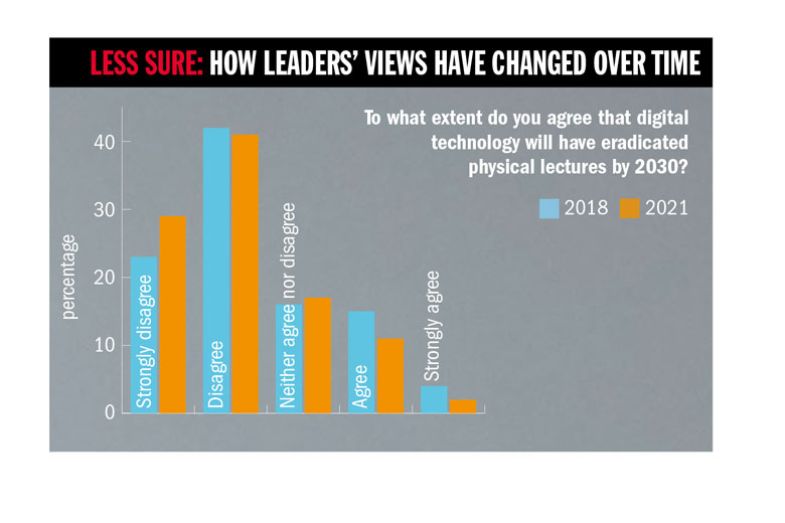Global university leaders have become more, rather than less, wedded to keeping in-person lectures for the long term during the course of the pandemic, a Times Higher Education survey suggests.
Among the 180 vice-chancellors and presidents quizzed for this year’s THE University Leaders Survey, published on 28 October, just 13 per cent expected physical lectures to have been supplanted by online alternatives by 2030.
That compared with 19 per cent when the same question was posed three years ago, while the proportion of vice-chancellors disagreeing that lectures will be “eradicated” has increased from 65 to 70 per cent.
Doubts about lectures’ viability have declined in every region, particularly in North America, where every university president expected them to persist, up from 84 per cent in 2018.

Enthusiasm for physical lectures was weakest in Asia, but even there, just 20 per cent of respondents felt that they would have disappeared by 2030, compared with 52 per cent who did not.
The findings suggest that, while Covid-19 restrictions have forced universities to move teaching online or shift to smaller group tuition more quickly than ever imagined, the loss of physical lectures underlined their value for many leaders.
“Undergraduate students clearly see campus as the centre of action; they want the full ‘university experience’,” said Erik Renström, vice-chancellor of Lund University in Sweden.
Tom Worthington, a computer science lecturer at the Australian National University, said he had been surprised at colleagues’ reluctance to “fully embrace” online education, despite having now delivered it for almost two years.
“These are people in the computing field, who you would expect to be the all-fired enthusiasts. But they [know] education is better with the personal touch, which is difficult to do online,” he said.
Mr Worthington said that the pandemic had attuned vice-chancellors to the value of the “premium experience” of face-to-face lectures. “It’s largely a matter of perception and marketing,” he said.
However, many universities have decided to shift away from lectures, including, in the UK, the University of Leeds. Speaking to THE earlier this year, Neil Morris, Leeds’ deputy vice-chancellor for digital transformation, said that there would “always be a place” for stimulating lectures but that they would probably “be reduced to around 20 per cent of the contact time for students in a taught module – from the current average of around 80 per cent – with the difference being replaced by more small-group, interactive, problem-based classes, supported by digital technology and online content”.
Meanwhile, a January study by the Australasian Council on Open, Distance and eLearning (Acode) found that 14 per cent of universities intended to abandon lectures, while 16 per cent were unsure. Another 42 per cent expected to offer a “reduced model” of lectures.
Acode president Michael Sankey said that vice-chancellors’ upbeat assessment of the lecture’s prospects partly reflected definitional changes. “Universities have rethought what a lecture is,” said Professor Sankey, director of learning futures at Charles Sturt University.
He said that lectures had become “conflated” with tutorials. “We might say we’re doing a lecture, [but] we’re not choosing the lecture theatre as the [venue]. We’re choosing more flat-floor spaces that allow for a combination of activities.”
Register to continue
Why register?
- Registration is free and only takes a moment
- Once registered, you can read 3 articles a month
- Sign up for our newsletter
Subscribe
Or subscribe for unlimited access to:
- Unlimited access to news, views, insights & reviews
- Digital editions
- Digital access to THE’s university and college rankings analysis
Already registered or a current subscriber? Login








